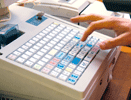POS Cash Register Basics
Electronic cash registers are becoming virtually indispensable to businesses that want to operate with the best state-of-the-art technology and record-keeping systems available.
What distinguishes modern cash registers? For one thing, electronic models typically use advanced digital displays to show financial data to customers. Cutting-edge models also include digital pin pads and interfaces for credit-based transactions.

Most electronic cash-handling hardware systems are connected to virtual platforms, such as credit card processing and merchant account systems. Vendors can use technologies such as voice over Internet protocol (VoIP), software as a service (SaaS), or proprietary wireless point of sale platforms to support the kinds of computing done by a modern cash register (calculating tax, tracking inventory, reporting store sales to a corporate headquarters, or performing other kinds of advanced data handling).
Electronic cash-handling registers are often "pathways" for more comprehensive planning models, where a multi-store POS system will get sale data directly to remote managers anywhere in the world. A system like this also will send crucial details, such as price changes, customer status updates, or memos, directly to local workers.
Power
Having "clean" electrical power is a POS cash register necessity that many businesses underestimate. When you set up multiple POS cash registers, they are networked together the same way computer systems in offices are. Fluctuations in the electrical supply due to blenders, meat slicers, microwaves, and other mechanical devices plugged into the same electrical circuit can easily cause enough noise in the power supply to wreak havoc with a POS cash register.
There are two common solutions to the problem. Power filtering can eliminate troublesome spikes and noise before they get to your computer terminals. The more robust solution is to install a dedicated circuit with an isolated ground and use it only for your POS cash registers and computers.
Power problems are one of the single biggest causes of problems in POS cash registers. Make sure your vendor analyzes your power situation and suggests appropriate safeguards.
Security
Since data is so important to businesses, electronic cash register machines are key parts of modern security systems as well. Buyers routinely ask vendors about how financial data and other details are effectively captured, kept private, and delivered to business leaders.
A merchant service plan helps businesses avoid the potentially embarrassing and costly issues that result when customer data is "leaked" to unauthorized parties. Along with other hardware, these new kinds of cash registers work with elaborate software architectures to get your business ready for the competition in a fast-paced, high-tech market.
Ready to Compare POS Systems Price Quotes?